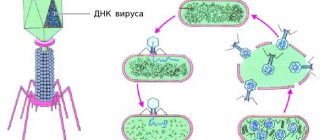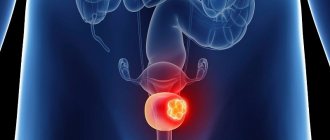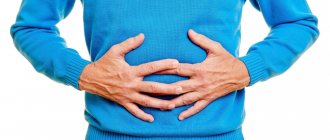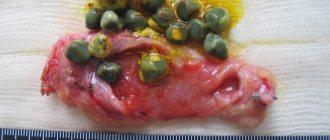01.02.2018
Bladder diseases: symptoms, diagnosis, treatment
In the medical practice of urologists, the most common illnesses associated with pathologies of the bladder. In this regard, there is a clear list of symptoms indicating one or another type of disease. The cause is congenital predisposition, trauma, specific or nonspecific inflammatory process. The presence of signs may indicate the development of serious abnormalities, so if discomfort occurs, it is important to consult your doctor.
Signs of bladder inflammation
The main manifestations of the disease are associated with disruption of the urination process. The most common complaints are:
- frequent urge to go to the toilet;
- decrease in urine volume;
- cutting and burning pain during urination or immediately after it;
- frequent awakening at night due to the urge to go to the toilet;
- change in the color of urine - sometimes it contains blood;
- weakness, irritability.
General health worsens only with the development of complications or with the chronic course of the disease. Usually the condition is assessed as satisfactory.
How does bladder inflammation occur in men?
Cystitis in men is a rare occurrence. This is due to the structure of the urethra. And therefore the symptoms also have a number of features:
- It occurs mainly in adulthood, after 40 years.
- As an independent disease, it is practically not diagnosed. In 90% of cases, male cystitis is accompanied by other pathologies of the genitourinary system. For example, narrowing of the urethra or urolithiasis.
- It is most often caused by gonococci and trichomonas, that is, genital infections.
- More often there is blood in the urine, this is a sign of vascular damage.
Important! Cystitis often occurs with prostate tumors. Therefore, a consultation with an andrologist is mandatory for men.
Considering that inflammation of the bladder occurs together with other diseases, it is more severe. There is a deterioration in general health, increased temperature, and chills.
In children, symptoms are more vague than in adults. Bedwetting often occurs, even if it was not typical for the child before. In old age, there may be no symptoms at all.
What are the symptoms of IC?
People with interstitial cystitis (IC) experience repeated discomfort, pressure, tenderness, or pain in the bladder, lower abdomen, and pelvic area. Symptoms vary from person to person, can be mild or severe, and may even change for each person over time.
Symptoms may include a combination of the following:
Urgency
Urgency is the feeling that you need to pee right now. Having a strong urge is normal if you haven't urinated in a few hours or if you've been drinking a lot of fluids. With IC, you may feel pain or a burning sensation and an urgent need to urinate before your bladder has a chance to fill.
Frequency
Urinating more frequently than you think you should, given the amount of fluid you drink. Most people urinate four to seven times a day. Drinking large amounts of fluid may cause you to urinate more frequently. Taking medications to lower blood pressure, called diuretics or diuretics, may also cause you to urinate more frequently. Some people with IC feel a strong, painful urge to urinate many times a day.
Pain
When your bladder begins to fill, you may feel pain rather than just discomfort that gets worse until you urinate. The pain usually goes away for a while when you empty your bladder. People with IC rarely experience persistent bladder pain. The pain may go away for a few weeks or months and then return. Some people may have pain without urgency or frequency. This pain may come from spasm of the pelvic floor muscles, a group of muscles that attaches to the pelvic bones and supports the bladder, bowel and uterus or prostate. Pain from pelvic floor muscle spasms may worsen during sex.
Types of cystitis
There are 2 large groups: chronic and acute. They differ in the severity of symptoms and the nature of the course.
- Spicy
It can be superficial (catarrhal) and hemorrhagic. Catarrhal inflammation does not extend beyond the mucous membrane of the bladder. It is considered the easiest form. The prognosis is favorable.
The hemorrhagic type is characterized by the penetration of infection into the blood vessels. This leads to blood in the urine. Ulcerative lesions also appear on the walls of the organ. Requires long treatment.
- Chronic
It is divided into 3 types - latent (hidden), persistent (with frequent exacerbations, more than 2 times a year) and interstitial. The latter form is characterized by a severe and prolonged course. In this case, the inflammation is not localized on the mucous membrane of the bladder, but spreads to the muscles and surrounding tissues.
If the disease occurs due to allergies, radiation or toxic damage, then a diagnosis of non-infectious cystitis is made. In cases of bacterial or viral infection - infectious.
Laboratory and hardware procedures
After passing urine in several stages (for men, usually 3 times), an analysis is performed that shows the content of blood, pus and bacterial environment. Depending on the distribution of components, a diagnosis is made. For example, if during 3 samples blood was found only in the last one, this indicates prostate ailments, and if uniformly, then an abnormality of the kidneys and urinary tract.
The presence of injuries, inflammations and formations is diagnosed using hardware. Ultrasound and X-ray equipment are used for this. The doctor may prescribe cystography, urography, computed tomography or endoscopy. Biopsy is also used to diagnose malignant and benign tumors.
What causes bladder inflammation in women?
The physiological features of the structure of the female urethra are such that pathogenic bacteria can easily get inside and cause inflammation. This is due to the fact that the channel itself is short and wide. It is also located near the vagina and anus.
Other reasons for the transfer of bacteria into the urinary tract:
- Improper intimate hygiene, as well as its lack. Maintaining hygiene during menstruation is especially important.
- Unprotected sex. If the immune system is weakened or the vaginal flora is disrupted, it can lead to inflammation.
- Transfer of E. coli from the anus when wearing thongs.
However, the presence of opportunistic bacteria in the genitourinary system does not always lead to the development of the disease. They can stay there for several years and not show themselves in any way. Only when the body’s defenses are reduced, for example, during hypothermia, do microbes begin to attack the body and painful symptoms appear. Therefore, the main causes of inflammation are bacteria and immune disorders.
Provoking factors include:
- changes in hormonal levels (menstruation, pregnancy, menopause);
- perineal injury or damage to the urethra;
- frequent colds, which indicates a problem with the immune system;
- lack of vitamins;
- local hypothermia (sitting on a cold surface or staying in cool water for a long time);
- gynecological manipulations;
- congenital pathologies of the development of the genitourinary system, which affect the process of urine discharge;
- sedentary lifestyle;
- rare trips to the toilet, forced retention of urination;
- frequent change of sexual partners.
Cystitis is also often diagnosed in women who suffer from other chronic infectious diseases, as well as obesity.
Epidemiology and clinical picture of cystitis
Classic bacterial cystitis is a disease that primarily affects women due to the specific structure of the lower genitourinary tract: a short urethra and the proximity of the bacterial flora of the vagina and intestines.
According to statistics:
- About 15% of adult women develop cystitis at least once a year;
- Almost two thirds of women experience bladder inflammation at least once in their lives.
- Of these two-thirds, 25% suffer from recurrent bladder infections.
You can get cystitis very simply, for example, by standing barefoot on a cold tile in the bathroom. The clinical picture may be caused by irritating foods and carbonated or alcoholic drinks.
Cold tile
Symptoms of cystitis develop relatively quickly. First signs:
- Frequent, painful urination with small amounts of urine. Often patients note that only a few drops are released.
- Burning when urinating;
- The appearance of a few drops of blood at the end of urination;
- Pain or cramping in the lower abdomen above the pubic bone;
- Body temperature is usually not elevated, and if present, it does not exceed 37.5 ° C.
Painful urination
Low temperature
Examination of the patient usually shows weak sensitivity in the lower abdomen, in the central part, that is, in the projection of the bladder itself.
Diagnosis of bladder inflammation
Only a urologist can make a correct diagnosis. The treatment regimen will depend on the type of pathogen. If the disease is not caused by an infection, consultation with other specialists is required.
After studying the medical history, the doctor prescribes additional research methods (general blood and urine tests). At the same time, a urine culture is done to determine the type of bacteria and its sensitivity to antibiotics. If necessary, ultrasound of the bladder and cystoscopy are performed. This allows us to exclude various neoplasms.
Chronic cystitis requires an immunogram. Sometimes women are referred for consultation to a gynecologist.
Cost of consultation?
| Name of service | Price, rub.) |
| Primary appointment with a urologist-andrologist | 2000 rub. |
| Repeated appointment with a urologist-andrologist | 1500 rub. |
| Primary appointment with an obstetrician-gynecologist | 2000 rub. |
| Repeated appointment with the obstetrician-gynecologist | 1500 rub. |
| Primary appointment with an obstetrician-gynecologist (candidate of medical sciences; doctor of medical sciences) | 2100 rub. |
| Repeated appointment with an obstetrician-gynecologist (candidate of medical sciences; doctor of medical sciences) | 1600 rub. |
| Prescription of treatment (drawing up an individual treatment regimen) | 1500 - 3000 rub. |
All our services and prices
Treatment
Acute cystitis often turns into a chronic protracted form due to self-medication. On TV, medications are often advertised that should instantly help cope with the disease. And when a person suffers from cutting pain every time he goes to the toilet, he grabs at any straw. But self-prescribing such drugs only temporarily eliminates or reduces symptoms. The inflammatory process in the urethra remains, and as a result, repeated cystitis after some time. In this case, laboratory diagnostics are not performed, which means it is impossible to determine the success of treatment.
Important! If you suspect cystitis, do not self-medicate, consult a doctor - a urologist or therapist.
Drug therapy
To eliminate the inflammatory process, you need to act on the pathogenic microorganisms that caused it. Therefore, taking medications is an important and main part of therapy, since medications are excreted by the kidneys, which means they pass through the urinary tract. Here it is important not to do harm, so the drugs are selected by the doctor taking into account the clinical picture and test results.
The main group for infectious diseases consists of antibiotics from different groups. If there is no positive dynamics after 3-4 days, a change in the drug is necessary. Uroantiseptics are also additionally prescribed. These are herbal preparations that are concentrated only in the genitourinary system, are not absorbed into the blood and have an antiseptic effect.
If the causative agent is a fungal infection, then taking antifungal agents is advisable. When hormonal disorders are confirmed, estrogens are used.
Diet
It is important to adhere to the drinking regime. Cranberry juice is especially effective and healthy. It has a good diuretic and bactericidal effect. A large amount of liquid accelerates the elimination of pathogenic microorganisms and restores the normal process of urination. In case of any inflammatory process, spices, spicy, smoked and fatty foods are contraindicated. Temporarily you need to give up pickles, mayonnaise, and meat products. Vinegar has a very bad effect on blood vessels, so all sauces and products containing it are also prohibited.
It is necessary to reduce the amount of salt, sugar, yeast products, and completely eliminate alcohol. Kefir, cottage cheese, milk, plant foods, fresh vegetables, steamed or boiled fish, and cereals are welcome.
Herbal medicine (herbal treatment)
Herbal decoctions and infusions are selected together with a doctor. They only complement drug therapy, but cannot be used instead of tablets. Herbs are widely used for mild forms of cystitis, as well as during periods of remission in chronic illness. Recommended herbs for cystitis include lingonberry leaf, dill seeds, bearberry, and horsetail.
Herbal infusions should be taken with caution in the presence of chronic pathologies of the genitourinary system. Diuretics are especially prohibited for urolithiasis.
Additional treatment
To reduce the painful syndrome, symptomatic therapy is used. These are analgesics and antispasmodics. In advanced cases with a long, debilitating course, sedatives or antidepressants are recommended. They help relieve tension, fear of going to the toilet, reduce irritability, and improve sleep quality.
It is also effective to wash the urethra or instillate it. This procedure is performed by a doctor. For this, special antiseptic solutions are used. For the treatment of male cystitis, lavage is rarely used, since the narrow structure of the urethra complicates the procedure.
Diagnosis of cystitis
A definitive diagnosis cannot be made solely on the basis of symptoms and physical examination; urine sediment examination is necessary. The diagnosis of cystitis is confirmed if, together with the above-mentioned signs of the disease, an increased number of leukocytes is detected in the urine.
Patients are prescribed:
- general and bacteriological urine tests;
- general blood analysis;
- smear for infections from the urethra;
- Ultrasound of the pelvis with a detailed examination of the bladder.
In difficult cases, cysto- and urethroscopy is performed.
Recommendations for bladder inflammation
For treatment to be effective, a number of rules must be followed. If you are ill, all warming procedures are prohibited. This is a bath, using a heating pad, visiting a bathhouse/sauna. Heat increases blood flow to the pelvic organs and also dilates blood vessels. This increases the inflammatory process and can also provoke spasms and an attack of pain.
Cold is also contraindicated, since hypothermia contributes to a decrease in immunity. For the same reason, refrain from swimming in a pond or pool. During the acute period, sexual intercourse is prohibited, even with a condom. During menstruation, it is advisable to use pads and carefully observe personal hygiene. It is better to avoid tampons and menstrual cups during an exacerbation. Also, during therapy you cannot adhere to strict diets for weight loss.
If cystitis is diagnosed, then it will help to overcome it quickly:
- Daily warm shower.
- Taking vitamins.
- No stress.
- Dosed physical activity.
- Rest.
- Refusal to wear tight synthetic underwear.
It is also important to dress appropriately. Do not expose the lumbar and pelvic area to hypothermia.
Where to get diagnosed and treated for bladder diseases in Moscow?
In a multidisciplinary medical center you can always undergo diagnosis and treatment of bladder diseases
. Our medical center is located between the Konkovo and Belyaevo metro stations (South-Western Administrative District of Moscow in the area of the Belyaevo, Konkovo, Teply Stan, Chertanovo, Yasenevo, Sevastopolskaya, New Cheryomushki metro stations " and "Trade Union"). Here you will find highly qualified personnel and the most modern diagnostic equipment. Our clients will be pleasantly surprised by our quite affordable prices.
Possible complications and prognosis of the disease
With timely contact with a urologist or therapist and proper therapy, the prognosis is favorable. In most cases, the disease requires outpatient treatment. But when cystitis is advanced and a chronic form has occurred, complications may develop. The most common are:
- pyelonephritis;
- nephritis;
- urethritis;
- trigonitis of the bladder.
Lack of treatment leads to the development of hemorrhagic or interstitial cystitis. These forms are characterized by a severe course. Possible hospitalization.
Important! In the presence of opportunistic bacteria in the urinary canal, the risk of cystitis is quite high.
Therefore, if you experience problems with urination or discomfort when going to the toilet, consult a doctor. Any warming up and taking medications from advertising will only hide the problem for a while. A complete recovery can only be achieved under the supervision of a urologist.
Bladder pain - how to prevent it?
To prevent a recurrence of a urinary tract infection, it is recommended to remember a few rules.
- If you have an inflamed bladder, drink at least 1.5 liters of fluid per day. Women are advised to drink a glass of water immediately before sexual intercourse.
- Do not hold urine in your bladder - you should go to the toilet as soon as you need to urinate. Women should urinate immediately after intercourse.
- It is necessary to ensure daily hygiene of intimate places.
- Do not wash or wipe the perineal area from front to back. In this way, bacteria can be transferred from the anal area to the urethra.
- It is recommended to avoid swimming in public pools and hot tubs.
A good way to prevent cystitis is to drink cranberry juice. It has the effect of inhibiting (suppressing) the adhesion of bacteria to the mucous membrane of the urinary tract, as a result of which these microorganisms are excreted in the urine without delay.
ONLINE REGISTRATION at the DIANA clinic
You can sign up by calling the toll-free phone number 8-800-707-15-60 or filling out the contact form. In this case, we will contact you ourselves.
If you find an error, please select a piece of text and press Ctrl+Enter
Along the beaten track
Judging by statistics, every second woman after the first episode of the disease develops a relapse within a year. And half of them have exacerbations more than 3 times a year. This happens because the initial treatment of acute cystitis was incorrect, and also because, when faced with a new case of the disease, many women, out of habit, take the medicine that helped them the last time. This is a huge mistake! The class of antibiotic must be changed, otherwise harmful bacteria, a small part of which could remain in the bladder, will develop resistance to the drug, and this will lead to the drug no longer working, and cystitis itself becoming chronic.
Therefore, a good doctor, before prescribing an antibacterial medicine, will definitely ask the patient how long ago and what kind of antibiotic he recently took.
BY THE WAY
In the West, cystitis is an inflammatory disease of the bladder and urethra. And in Russia, the disease is divided into cystitis and urethritis. In the first case we are talking about inflammation of the bladder, in the second – about inflammation of the urethra. And although these are details, we will adhere to the domestic view of the disease.







